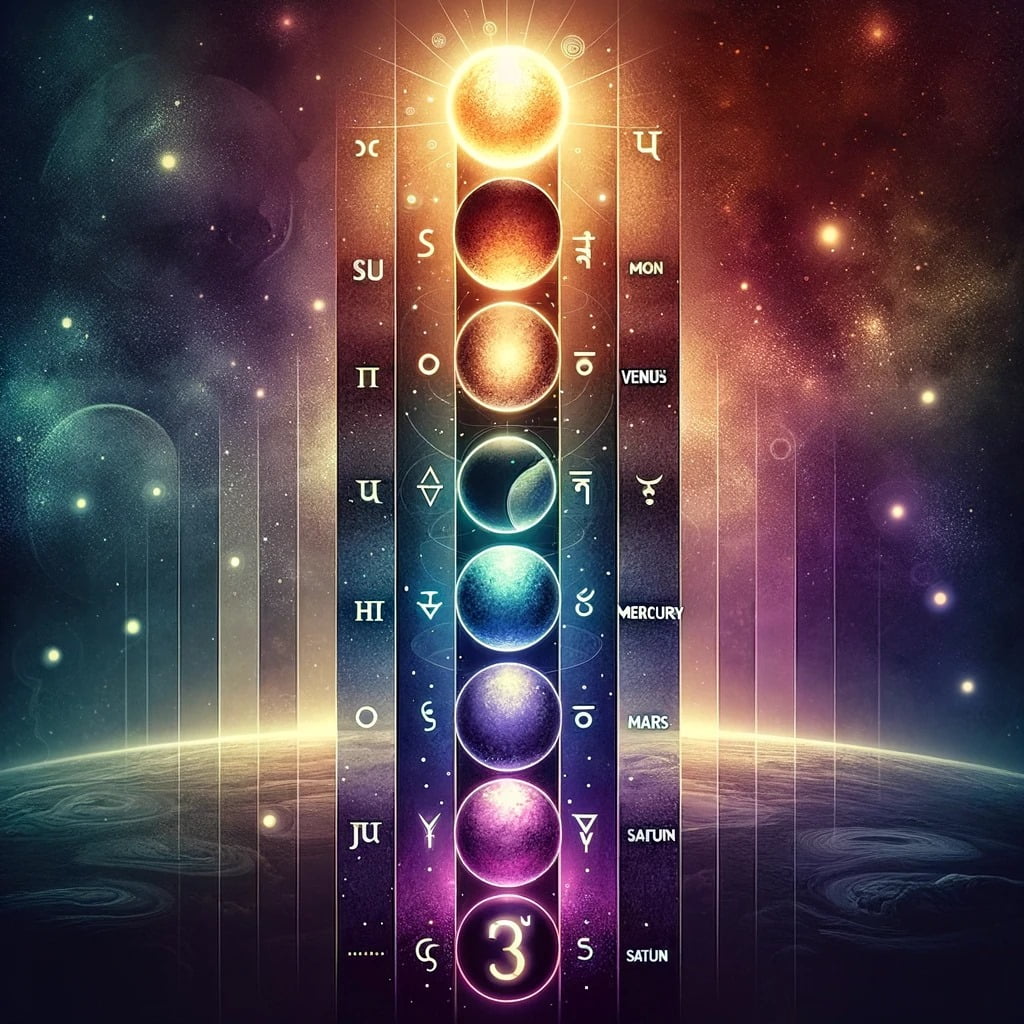Understanding Naisargika Bala: The Natural Strength of Planets in Vedic Astrology
 April 20, 2024
April 20, 2024 In Vedic astrology, understanding the inherent strengths of planets—known as Naisargika Bala—is crucial for comprehensive astrological assessments. Naisargika Bala, or natural strength, refers to the inherent power that each planet possesses irrespective of its temporal or spatial conditions. This concept is part of the broader Shad Bala system, which evaluates planetary strengths through various dimensions to determine their effects on human life. This blog explores Naisargika Bala, explaining its significance and how it influences astrological interpretations.
Table of Contents
What is Naisargika Bala?
Naisargika Bala translates to ‘natural strength’ and is one of the six components of Shad Bala used in Vedic astrology to assess the innate potency of planets. This strength is fixed and does not change with time, location, or other astrological variables, making it a fundamental factor in evaluating a planet’s overall influence in a natal chart.
The Role of Each Planet in Naisargika Bala
In the hierarchy of Naisargika Bala, each planet is assigned a fixed value that reflects its basic ability to influence life on Earth. Here’s a look at how each planet ranks in terms of natural strength, from strongest to weakest:
- Sun: The Sun, representing the soul, vitality, and authority, is considered the most powerful in terms of natural strength. It symbolizes leadership and willpower, having profound influences on individuality and success.
- Moon: Next in strength, the Moon affects the mind, emotions, and public life. Its strong natural strength signifies its crucial role in determining emotional stability and public interactions.
- Venus: Venus commands significant strength, governing love, beauty, wealth, and relationships. Its strong position indicates a beneficial influence on comfort, luxury, and interpersonal connections.
- Jupiter: Known for wisdom and expansion, Jupiter’s substantial strength supports growth, prosperity, and ethical standards in a person’s life.
- Mercury: Mercury, which rules communication, intellect, and logic, holds moderate strength. It influences learning, speech, and analytical abilities.
- Mars: Representing energy and courage, Mars has lesser strength compared to Mercury, impacting assertiveness, conflict, and physical actions.
- Saturn: Although it ranks lower, Saturn’s role in discipline, longevity, and perseverance is pivotal. It represents challenges that foster growth and maturity.
- Rahu and Ketu: The lunar nodes, Rahu and Ketu, have the least natural strength but are influential in shaping life’s karmic direction and spiritual development.
Calculating Naisargika Bala
Unlike other components of Shad Bala that require complex calculations, Naisargika Bala is straightforward since it involves fixed values attributed to each planet. Astrologers use these values to understand the basic influence of planets without the need for dynamic computation.
Importance of Naisargika Bala in Astrological Analysis
The natural strength of a planet is crucial for interpreting its core influence on various aspects of life, such as personality, career, relationships, and spiritual growth. A planet with high Naisargika Bala will prominently express its qualities, even if other factors like positional strength (Sthana Bala) or temporal strength (Kala Bala) are not as favorable.
Practical Applications of Naisargika Bala
Recognizing the natural strength of planets helps in:
- Personality Analysis: Understanding which planets are inherently strong provides insights into a person’s natural tendencies and potential.
- Life Guidance: Knowing the stronger planets can guide individuals to focus on areas that are likely to be more fruitful and satisfying.
- Remedial Measures: Astrologers suggest remedies to strengthen the influence of weaker planets, balancing the horoscope for better life outcomes.
Leveraging PocketPandit for Enhanced Astrological Insights
In the realm of Vedic astrology, where understanding the fundamental strengths of planets is key, PocketPandit emerges as a valuable tool. This advanced platform combines cutting-edge technology with the ancient wisdom of Vedic astrology to offer real-time, personalized astrological insights. Whether you’re looking to understand the inherent strengths of planets in your horoscope or seeking guidance on life’s important decisions, PocketPandit provides detailed analyses and practical advice right at your fingertips. Explore how the natural strengths of planets influence your life by visiting pocketpandit.com/ask or downloading the PocketPandit app for on-the-go astrological support.
Conclusion
Naisargika Bala offers invaluable insights into the inherent power of planets as per Vedic astrology. By evaluating the natural strengths, astrologers and astrology enthusiasts can gain a deeper understanding of the planetary influences that are fundamentally robust and pivotal in shaping life’s journey. This knowledge not only enhances astrological predictions but also aids in personal development and spiritual alignment. With tools like PocketPandit, adapting to these astrological insights becomes not just feasible, but a strategic advantage in navigating through life’s challenges and opportunities.
Up Next: Unveiling Bhav Bala: Understanding House Strength in Vedic Astrology
Explore Our Previous Blog: Unveiling Chestha Bala: Understanding Motional Strength in Vedic Astrology
Connect with PocketPandit Everywhere!
Discover the magic of Vedic Astrology with Pocket Pandit across all your favorite platforms! Get detailed insights, practical remedies, and fascinating content on zodiac signs, nakshatras, yogas, and planetary movements tailored just for you. Whether you enjoy fun reels, quick tips, or in-depth videos, we’ve got something for everyone. Let astrology become a part of your journey,simple, engaging, and full of knowledge.
Join us now:





1 Comment